|
The Billy Hall Story
by Jack Litchfield
(The CAPS CD entitled "Dance Bands from Canada
1922-1930", that was compiled by Bill Pratt, contains
three tracks by the New Princes’ Toronto Band. The
trombonist was Billy Hall. The presentation at the
November 30, 2003 meeting was given by long-time CAPS
member Jack Litchfield and by Chris Hall, who is
Billy's grandson and is himself a professional musician.
During the talk Jack played five records and Chris
projected 98 slides.)
Billy Hall
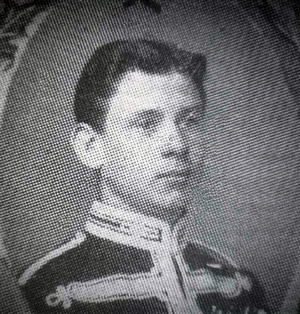
|
|
The Billy Hall story begins 114 years ago in London,
England, with a young woman named Alice Jones. She
fell in love with Richard Hall and announced that they
were going to be married. Her wealthy father forbade
the marriage, because Alice was still a teen-ager. When
she persevered, her father threatened to cut her off if
she married Richard. This was no idle threat in
Victorian-era England. Despite the edict, Alice and
Richard were wed, and her father carried out his threat
to provide no support for the newlyweds.
Alice and Richard subsequently had four children,
including Billy, who was born in 1894. Life was very
hard for the family. Richard's heavy drinking kept them
poor. He died of pneumonia in 1900. Following her
husband's death Alice was employed as a charwoman,
earning about six shillings per week. She paid a rent of
five shillings per week for the two rooms she occupied.
Alice was in desperate straits. She had to support
herself and four children on one shilling a week. She
could not afford both food and shelter, and was forced
into changing her address frequently, skipping out
without paying the overdue rent. The situation could not
continue forever, and eventually Alice decided to have
Billy (aged 8) and his brother Jimmy (aged 6) admitted
to Barnardo's, a charitable organization.
The Toronto Orchestra (Charles Aylett photographer),
Toronto, 1924
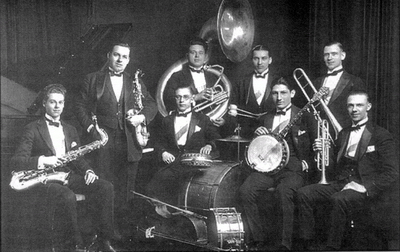
|
|
It must have been an agonizing decision for Alice to
make, but she had no option. In August 1903 she
applied to have Billy and Jimmy admitted.
Billy began to learn music, playing the cornet. He was
asked if he would like to go to Canada to tour with the
Barnardo's Musical Boys Band. Billy agreed, and in
September 1912 they sailed.
Billy spent the next seven months touring Canada with
the band, which consisted of ten young men. Evidently
Billy was the senior bandsman, as on the official band
photograph he occupied a position of honour at the
right hand of the musical instructor.
In November 1912 the band performed four times at
Massey Hall, which must have been a great thrill for
Billy,still only 17 years old.
The band continued its tour, returning to Toronto during
the Christmas holiday and gave six performances. Their
final engagement was in May 1913, in Toronto.
Billy found employment in St. Marys, a small town of
4,000 residents situated 150 kilometres west of
Toronto. At the Maxwell Factory he was learning the
machinist trade, to which he had taken a natural liking.
He was making good use of his musical training,
showing marked musical ability.
New Princes Toronto Band recording acoustically
(probably for Columbia), 1924/25

|
|
In 1915 Billy had nearly completed his training as a
machinist and was making shells for the British army.
The first World War had been raging for nearly a year,
and Billy was eager to join. In July 1915, he enlisted in
the 33rd Battalion of the Canadian Expeditionary
Force.
The Canadian Corps was engaged in a desperate
struggle in the Somme, and on October 5, 1916, Billy's
unit was sent to the front. Only a few hours later he
was seriously wounded. Billy had seen a friend in an
exposed position, and raised his arm to wave him
down. At that instant he was hit. A shrapnel ball
entered his left side under the heart, passed through his
diaphragm, and lodged in his back.
He was in the hospital for three months, followed by
two months of physical therapy. A year after his injury
he had recovered sufficiently to be back on duty and
playing trombone in the military band. In July 1919 he
arrived back in Toronto and was discharged from the
army. He took a room at the corner of Shuter and
Mutual Streets, and joined the musician's union as a
trombonist.
Billy lived in Toronto at least a year. During this time he played
with dance bands around town, earning his living as a professional
musician. In 1920 he moved back to St.
Marys, back to his old job as machinist at the
Maxwell Factory. He was also quite active in the
music field. He usually played saxophone rather than
cornet or trombone.
New Princes Toronto Band, 1926
(note the maple leaf and beaver design on the drum).
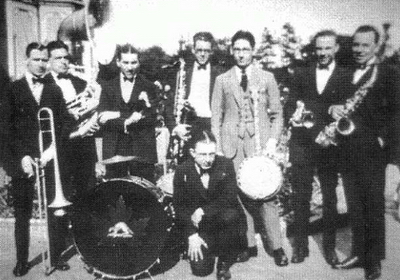
|
|
In between his day work at Maxwell's and his orchestra
jobs, Billy made time to court a beautiful St. Marys
teen-ager named Frances Martin. Within a few months
Billy and Frances were married, in June 1921.
On her wedding day Frances was 18 years old, the
same age that Billy's mother had been on her wedding
day. There the similarity ended, however, as Frances
was marrying a man who was industrious, motivated,
respected, and destined for success.
In October 1921, Billy and Frances moved to Toronto,
to an apartment on College Street. Billy renewed his
membership with the musicians union, and was listed
in the directory on trombone and sax. He found a long-
term job with a dance band, and played at the Masonic
Temple (corner of Yonge and Davenport), and at the
Palais Royale at Sunnyside Beach.
Frances was pregnant, so they moved from the
apartment to a house on Coxwell Avenue. In April
1923, Frances, aged 20, gave birth to their first child,
Manning Hall. He was named after Manning King, a
good friend of Billy who played saxophone in the
orchestra with Billy. King paid $15 for a highchair. In
later years Manning, who never liked his name, used to
say "I never saw the highchair, and I've never seen the
$15, and I've been stuck with the name ever since."
Late in 1923, Sam Laschiver, the booker for Rector's
Club in London, England, came to Canada to select a
band to play at the club. He listened to many musicians
in Montreal, Ottawa, and Hamilton, and finally decided
that the men he wanted were in Toronto. None of the
organized dance orchestras he heard suited him, so he
asked Hal Swain, a Toronto saxophonist, to front the
band and recruit the other musicians. Laschiver gave
them the name "The Toronto Orchestra". They were
Toronto's best young dance-band and jazz musicians,
"mostly youngsters, all as keen as mustard."
New Princes Toronto Band, 1926.
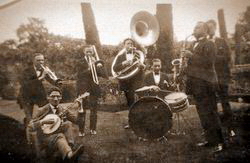
|
|
Hal Swain, the leader, could double on cornet. He had
been living and playing in Toronto for years, as had
Alfie Noakes, cornet, and Les Allen, sax and clarinet
who had taken voice lessons for seven years. The other
recruits had been living and playing in Toronto for
shorter periods - Billy Hall, trombone and sax; Frank
Walsh, piano and organ; Dave Caplan, banjo; Ran
Garrison, sousaphone, trombone, and sax; and Ken
Kenny, drums. Alfie Noakes and Dave Caplan had
been playing in the main ballroom of the King Edward
Hotel. Alfie Noakes played "real jazz", and must have
been the best trumpet player in town.
Hal Swain assembled the band and announced that he
had a one-year contract for the band to appear in
London. Billy and the other orchestra members agreed,
and he and Frances prepared to leave for England.
The band had only one public engagement before they
left. On Thursday, February 21, 1924, Hal Swain and
his All-Star Orchestra played a dance at the Alexandra
Academy in Hamilton. The newspaper ad announced
that "This orchestra has been engaged for a year to
play in London, England, and this is its only Canadian
appearance before sailing next week."
Billy Hall with wife Frances and son Manning, London, 1926
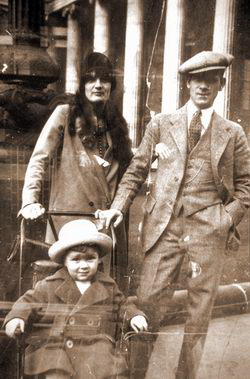
|
|
A week later, Billy, Frances, and their son Manning,
aged ten months, together with the other members of
the Toronto Orchestra, left Toronto by train to board
the RMS Montclare which was leaving Saint John,
New Brunswick, bound for Liverpool. The orchestra
rehearsed during the crossing, and played a ship's
concert.
The orchestra had been engaged to play at Rector's
Club in London, but when they arrived in Liverpool
they learned that the club had closed. Hal Swain and
the men decided to proceed, Rector's or no Rector's.
The same day they arrived, they played an audition that
Sam Laschiver had hastily arranged for them with the
New Princes Restaurant in Piccadilly, which was then
enjoying the best of success. Before the end of the
evening they had a new contract to play at the
Restaurant, and there they stayed for two years.
From November 1924 to February 1926 the band
recorded in London, and 54 sides were issued in
Britain on the Columbia label. On the records the
orchestra is named New Princes Toronto Band. Les
Allen remembered that the early recordings were
acoustical. "We had to stick our heads into the horns,
as well as our instruments." Les also remembered that
the recording company was constantly changing the
appearance of the studio to try to get the best sound.
This was mostly accomplished by moving the heavy
drapes.
In 1925 the New Princes Toronto Band recorded for
companies other than Columbia. Seventeen titles were
issued on Regal, Imperial and Currys, (which were ten-
inch records), and Oliver, Pigmy, and Mimosa (which
were 5%" records). As the orchestra was under contract
with Columbia, these records were issued under
pseudonyms.
Hal Swain left the orchestra in February 1926,
evidently amid some hard feelings, and returned to
Toronto for a visit. In March 1926, Dave Caplan, the
banjoist, formally took over the band.It then obtained
further engagements around London. During the
summer of 1926, Caplan obtained a booking for the
orchestra in Berlin on the strength of its Columbia
records. But this led to a major personnel change. For
various reasons most of the original members were not
interested in going to Germany. Two of the musicians
decided to accompany Caplan, and the band arrived in
Berlin in August 1926, billed as Dave Caplan's
Toronto-Band from Canada. The rest of the men
decided to remain in England. Billy opted to remain in
London, as he and Frances were now the parents of
two children, their second son David having been born
in May 1926. David is Chris Hall's father.
New Princes Toronto Band, 1926.
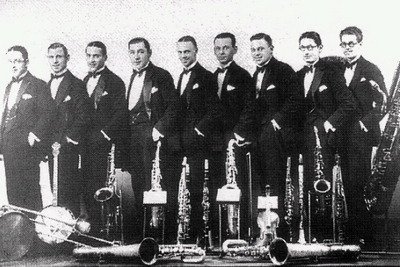
|
|
Billy joined the Piccadilly Revels Band, an orchestra
that was assembled by Jack Hylton for the Piccadilly
Hotel. It was an eleven-man group under the leadership
of Ray Starita. His brother, Rudy Starita, played drums,
xylophone, and vibraphone in the band. Billy was with
the band from the summer of 1926 until circa
September 1927.
In December 1926, the Piccadilly Revels Band began
recording, and between then and August 1927, 52 sides
were issued in Britain on the Columbia and the Regal
labels. Around September 1927 Ray Starita was forced,
for economic reasons, to reduce the size of the
Piccadilly Revels Band at the Piccadilly Hotel to seven
musicians. The brass section and one saxophonist were
released. Billy joined Jack Hylton, whose orchestra had
achieved a huge commercial success. When a vacancy
occurred at the Kit Cat Club, Billy joined Hylton's Kit-
Cat Band. Billy was with the Jack Hylton organization
for two years, circa July 1926 to June 1928, playing
with the Piccadilly Revels Band, Jack Hylton and his
Orchestra, and the Kit-Cat Band.
In 1928 Billy obtained a position in Brussels with
Compere's New Royal Dance Band, led by Belgian
cornetist and trumpeter René Compere. Billy found
accommodation for himself and the family in Brussels.
In 1929 the band was playing at the Embassy-Club,
located in the centre of Brussels. Compere's New
Royal Dance Band had eight musicians: René Compere
on trumpet and violin, Billy on trombone, two reeds,
and four rhythm. The show at the Embassy-Club was a
musical variety including singing and dancing. There
were three performances a day, tea-time at 5:30 pm,
evening at 10:30 pm, and late-night at 1:30 am.
Piccadilly Revels Band, London, 1926/27.
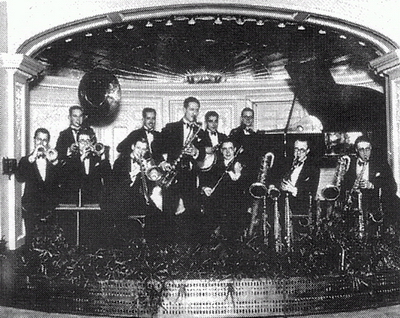
|
|
Billy and Frances remained in Brussels for a year,
during 1928 and 1929. In 1929 they moved to
Germany, where Billy played for a year in Berlin and
Hamburg. He played with the Oscar Joost Orchestra,
and with the London Sonora Band, which toured the
Rhineland in 1930. He was also a member of the Paul
Godwin orchestra which played for radio broadcasts
and recorded movie sound tracks.
For the year that they were in Germany, they were
living in hotels and rooms. Frances was getting fed up
with the pillar-to-post routine, never being able to live
in a place of their own. She wanted to return to Canada
so that Manning would receive a Canadian education.
So, in June 1930, Frances and the children sailed from
Hamburg, returning to St. Marys to live with her
mother. Billy wrote to her every few days, and in one
letter he mentioned that he was planning to join her in
St. Marys in the near future.
Early in September 1930, Billy had just arrived in
Hamburg, playing with one of the orchestras there. On
September 16 the Paul Godwin orchestra made its first-
ever appearance in Hamburg, opening at the Trocadero.
It was a two-week engagement, closing on September
30. This was a wonderful opportunity for Billy to get
together with his friends in the Godwin orchestra. On
Sunday, September 28, Billy, Paul Godwin, and the
other band members took a boat cruise around the
harbour of Hamburg. The group posed for photos. In
contrast to the others, Billy appeared rather solemn.
René Compére's New Royal Dance Band, Brussels, 1928/29.
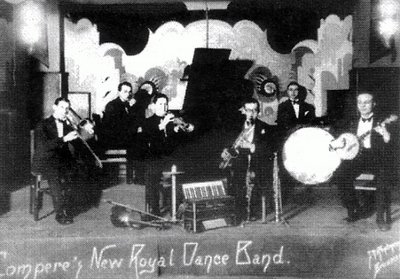
|
|
On the following day, Monday, September 29, he was
taken seriously ill, and was rushed to the Eppendorf
General Hospital. He was operated upon the next day.
The doctors found that his old war wound had never
closed up, and as a consequence an infection had set in.
When his fellow members of the orchestra visited him
on Saturday he seemed to be recovering, but his
condition suddenly turned grave. On Sunday, October
5, Frances received a cable from Hamburg which read,
"Bill very ill from operation. Great danger." The next
day she received a second cable which read "Bill
passed away Sunday 10.30 a.m." For the rest of his
life, David, only four years old at the time, would
recall his mother screaming when she read the cable.
Billy had died exactly 14 years to the day from the day
he had been wounded. At his death he was 35 years
old. Frances was a widow at 28.
The St. Marys newspaper published tributes that read:
Billy Hall is still well remembered here by many old
friends. He was admired and respected wherever he
went. The men with whom he associated in his work
were his warm friends. He was a general favorite with
his pals and many of [them] will learn of his untimely
end with deep regret.
|